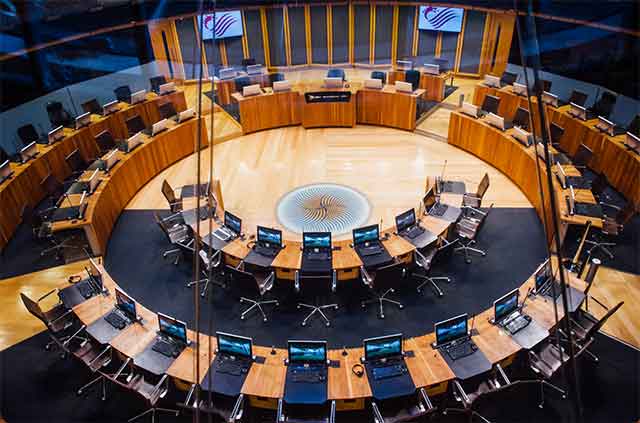The Welsh Government must be courageous and shift money from the “bottomless pit” of hospitals to reverse relative defunding of GP surgeries, doctors told a Senedd inquiry.
Gareth Oelmann, chair of the British Medical Association (BMA) Cymru’s GP committee, criticised a decline of funding for general practice as a whole over many years.
Dr Oelmann, a GP partner in Cwmbran, Gwent, said the proportion of NHS Wales spending dedicated to general practice has fallen from 8.7% to 6.01% since 2005/06.
He told the Senedd’s health committee: “That decline… has come at the detriment of practice viability, sustainability and you’ll have seen the figures within the last 10 years of how 100 practices have returned their contracts.”
The BMA is calling for the proportion of the NHS Wales budget spent in general practice to be restored to 8.7% within three years, which would require an investment of £292m.
‘Firefighting’
Ian Harris, a GP partner in Bridgend who is deputy chair of the BMA committee, said GPs can be part of the solution to pressures on hospital services.
“But, certainly, we can’t do more with less,” he stressed. “And, over the years, we’ve been asked to do more and more and more with a reduced proportion of the NHS spend.”
Rowena Christmas, chair of the Royal College of General Practitioners (RCGP) Cymru, warned GPs are firefighting all the time due to reducing budgets.
She said: “We’ve only got one pot of money and we need to be courageous with it and take it away from the bottomless pit of the hospital and put a little bit more towards primary care.”
In its written evidence, the Royal College of GPs highlighted research showing that every £1 spent on general practice saves £3 of hospital costs.
Pressed on why health boards do not accept the need to reverse the decline in GP funding, Dr Oelmann warned of a blindspot due to lack of primary care voices around the table.
‘Supertanker’
Dr Harris added that it is also a policy decision at Welsh Government level to focus on the shiny bits of the health service such as hospitals and waiting lists.
“That needs to change and we’re making that argument,” he said while giving evidence to an inquiry on the future of general practice on September 17.
“But it’s like trying to turn around a supertanker because the direction of travel… has been to relatively defund general practice and primary care in favour of other sectors.”
Dr Oelmann emphasised the need to look at the overall pot as well as reform of the Carr-Hill formula which was designed in the 1990s to distribute funding to practices.
Dr Harris echoed concerns about the clamour surrounding the “outdated” Carr-Hill formula, with a focus needed on total funding to avoid “moving around the deckchairs on the Titanic”.
The panel raised concerns about uncertainty arising from prolonged contract negotiations, with Dr Harris saying: “You’re always on the backfoot and we’re always working in arrears.”
‘Train Work Leave’
Tom Kneale, a GP in Ruthin, Denbighshire, added: “It’s exceptionally difficult… to predict what services I can provide within my practice if I don’t know what funding’s coming in.
“We don’t know whether we can replace our boiler, we don’t know if we can afford another salaried GP. This is an exceptionally difficult circumstance to work in day in, day out.”
Dr Oelmann warned of the human cost of the GP funding crisis and the attritional nature of the job – with the workforce decreasing while the workload increases.
More than 80% of GPs feel patient safety is being compromised by excessive workloads and 37% are ‘unlikely’ to still be working in general practice in five years, an RCGP survey found.
Dr Harris said Wales is about 700 GPs short but practices cannot afford to employ available trainees – some of whom are subsequently deported because they do not have a sponsor.
He suggested the Welsh Government’s “Train Work Live” campaign to attract health care professionals to Wales might be better titled “Train Work Leave”.

